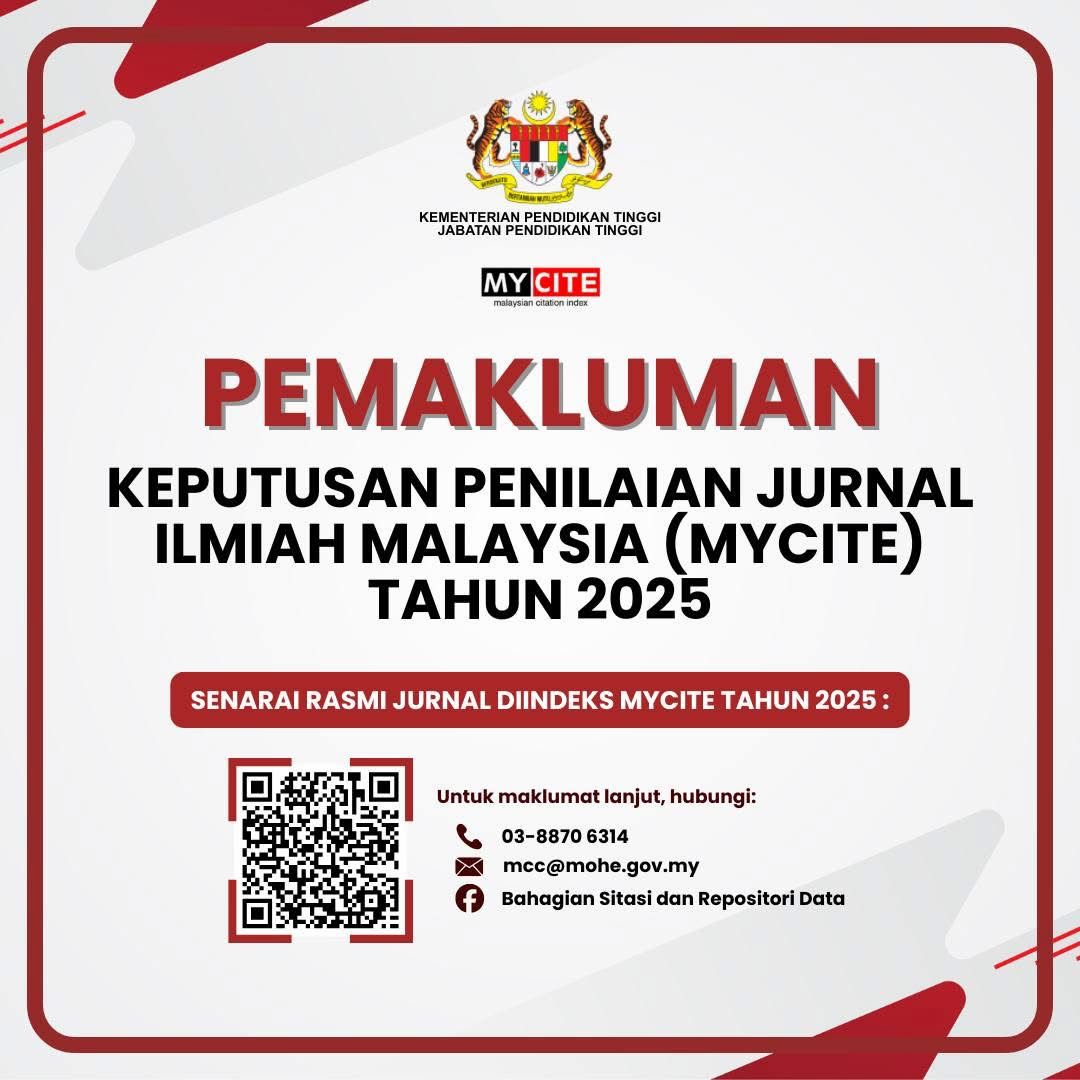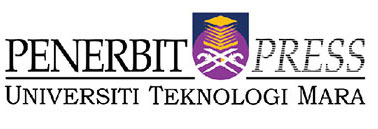Pengajaran Tarannum Dalam Kalangan Guru Pendidikan Islam Di Sekolah Rendah
Teaching Tarannum Among Islamic Education Teachers in Elementary Schools
DOI:
https://doi.org/10.24191/idealogy.v8i1.424Keywords:
Seni, Pengajaran, Tarannum, Guru Pendidikan IslamAbstract
ABSTRAKAl-Quran adalah keajaiban dari Allah SWT yang amat bernilai kepada manusia dari segi bahasa, sejarah, dan peradaban, serta nilai-nilai yang boleh diperoleh daripada kandungannya. Terdapat usaha berterusan yang dijalankan secara tidak formal melalui kelas pembelajaran tarannum yang dikendalikan oleh guru-guru pendidikan Islam. Justeru, tujuan kajian ini dijalankan adalah untuk mengkaji amalan pengajaran ilmu tarannum dalam kalangan guru pendidikan Islam di sekolah rendah. Kajian kuantitatif ini menggunakan instrumen soal selidik dan melibatkan 62 orang guru-guru pendidikan Islam daripada 24 buah sekolah rendah di dalam Daerah Perak Tengah. Kajian ini menumpukan perhatian kepada amalan pengajaran ilmu tarannum berdasarkan model pengajaran yang dicadangkan oleh al-Qabisi. Tahap amalan pengajaran ilmu tarannum dalam kalangan guru pendidikan Islam di sekolah rendah pula dianalisa secara statistik deskriftif menggunakan skor min dan statistik inferensi varians (ANOVA). Secara keseluruhannya, dapatan menunjukkan bahawa amalan pengajaran ilmu tarannum dalam kalangan guru pendidikan Islam adalah pada tahap yang tinggi. Semua faktor amalan pengajaran ilmu tarannum dalam kalangan guru pendidikan Islam di sekolah rendah yang merangkumi matlamat pengajaran, objektif pengajaran, kaedah pengajaran, teknik pengajaran, alat bantu pengajaran dan penilaian pengajaran mencatatkan tahap yang tinggi. Dapatan kajian juga menunjukkan bahawa tidak terdapat perbezaan yang signifikan tahap amalan pengajaran ilmu tarannum dalam kalangan guru pendidikan Islam di sekolah rendah berdasarkan pengalaman mengajar. Kajian ini juga mengesahkan model amalan pengajaran al-Quran yang diperkenalkan oleh al-Qabisi sebagai asas kepada pengukuhan amalan pengajaran ilmu tarannum bagi guru-guru pendidikan Islam di sekolah rendah.
Kata Kunci: Al- Quran, Tarannum, Guru Pendidikan Islam, Sekolah Rendah, Pengalaman Mengajar, Al-Qabisi
ABSTRACT
The Quran is a miracle from Allah SWT that is very valuable to humans in terms of language, history, and civilization, as well as its values. There is an ongoing effort that is carried out informally through tarannum learning classes run by Islamic education teachers. Therefore, the purpose of this study is to evaluate the tarannum teaching practice among Islamic education teachers in primary schools. This quantitative study was conducted using a questionare and involving 62 Islamic education teachers from 24 primary schools in the Perak Tengah District. This study focuses on the practice of teaching tarannum knowledge based on the teaching model proposed by al-Qabisi. The level of teaching practice of tarannum among Islamic education teachers was analyzed using the mean score and variance inference statistics (ANOVA). Overall, the data analysis shows that the practice of teaching tarannum among Islamic education teachers is at a high level. All factors of the practice of teaching tarannum knowledge among Islamic education teachers in primary schools, which include teaching goals, teaching objectives, teaching methods, teaching techniques, teaching aids, and teaching evaluation, recorded a high level. The findings of the study also show that there is no significant difference in the level of teaching practice among Islamic education teachers in primary schools based on their teaching experience. This study also confirms the practice model of al-Quran teaching introduced by al-Qabisi as a basis for strengthening the practice of teaching tarannum knowledge for Islamic education teachers in primary schools.
Keywords: Al-Quran, Tarannum, Islamic Education Teacher, Elementary School, Teaching Experience, Al-Qabisi
References
Hair, J. F., Black, W. C., Babin, B. J., & Anderson, R. E. (2010). Multivariate Data Analysis. Pearson.
Khairul Latif, M., Jimaain, T., Azmi Jasmi, K., & Bharu, J. (2020). Competence and Method of Teaching Tarannum Al-Quran Among Teachers of Special Class on Reading and Memorizing Al-Quran Skill (KKQ) in Johor. In Advances in Social Science, Education and Humanities Research (hal. 249–253). Atlantis Press. https://doi.org/10.2991/ASSEHR.K.200130.177
Muhamad Nasir Mohamad Salleh, Zaharah Hussin, & Mohd Faisal Mohamed. (2020). Analisis Keperluan Pembangunan Model Pengajaran Taranum Al-Quran: Satu Kajian Penerokaan. JUKU: Jurnal Kurikulum & Pengajaran Asia Pasifik, 8(3), 27–38. Diambil dari http://ojie.um.edu.my/index.php/JUKU/article/view/25774
Murray J. Fisher, & Andrea P. Marshall. (2009). Understanding descriptive statistics. Australian Critical Care, 22(2), 93–97. https://doi.org/10.1016/J.AUCC.2008.11.003
Nurul Auji Hasbullah, Ahmad Sanusi Azmi, Adnan Mohamed Yusoff, & Norasikin Fabil. (2020). Ilmu Tarannum Di Malaysia : Amalan Dan Kaedah Melagukannya. In e-Proceeding of The 2nd International Conference On Contemporary Issues In Al-Quran And Hadith 2020 (THIQAH 2020) (hal. 13–23).
Ramli, I., & Ab Gani, M. A. A. (2022). Kelangsungan Perbincangan Berkaitan Kesenian dan Reka Bentuk. Idealogy Journal, 7(2), V–VI. https://doi.org/10.24191/IDEALOGY.V7I2.359
Ranjit Kumar. (2011). Research Methodology: a step-by-step guide for beginners (3 ed.). Sage Publications Inc. Diambil dari www.sagepublications.com
Roger Watson. (2015). Quantitative research. Nursing standard (Royal College of Nursing (Great Britain) : 1987), 29(31), 44–48. https://doi.org/10.7748/NS.29.31.44.E8681
Sedek Ariffin, Sedek Ariffin, & Zulkifli Mohd Yusoff. (2017). Mastering of Tarannum al-Quran: An Analysis on Participants of al-Quran Reciting Competition in Klang and Sepang Secondary School. QURANICA - International Journal of Quranic Research, 9(1), 67–92. https://doi.org/10.22452/QURANICA.VOL9NO1.4
Sharil, M. S. M., Daud, N. C., & Shaharudin, H. (2022). Identifying the Teaching Aid Effect That Parents Use to Enhance Reading Skill of Their Children. Idealogy Journal, 7(1), 71–79. https://doi.org/10.24191/IDEALOGY.V7I1.317
Zetty Nurzuliana Rashed, Mariam Abd Majid, Sahlawati Abu Bakar, Suriani Sudi, Wan Ramizah Hasan, & Muhammad Yusuf Marlon BAbdullah. (2015). Amalan Pengajaran Guru Tilawah Al-Quran: Kajian Kes Di Maahad Tahfiz Sains Negeri Selangor. Tinta Artikulasi Membina Ummah, 1(1), 77–86.
Downloads
Published
Issue
Section
License
UiTM Press (the Publisher) has agreed to publish the undersigned author’s paper in Idealogy Journal. The agreement is contingent upon the fulfilment of a number of requirements listed below.
1. The undersigned author warrants that the paper entitled below is original, that it is not in any way libellous or unlawful in Malaysia, that it does not infringe any copyright or other proprietary right. The undersigned hereby represents and warrants that he/she is the author of the paper, except for material that is clearly identified as to its original source, with permission notices from the copyright owners where required. The undersigned represents that he/she has the power and authority to sign and execute this agreement.
2. The undersigned author warrants that the paper entitled below has not been published elsewhere, and also it will not be submitted anywhere else for publication prior to acceptance/rejection by this Journal.
3. By submitting the paper entitled below, the undersigned author agrees to transfer the rights to publish and distribute the paper in an international e-journal (entitled above) to Publisher.
4. The undersigned author agrees to make a reasonable effort to conform to Publisher's submission guidelines and to liaise with the editor to ensure that the requirements of these guidelines are met to a reasonable degree.
5. The corresponding author signs for and accepts responsibility for releasing this material on behalf of any and all coauthors. This agreement is to be signed by at least one of the authors who has obtained the assent of the co-author(s) where applicable. After submission of this agreement signed by the corresponding author, changes of authorship or in the order of the authors listed will not be accepted.




